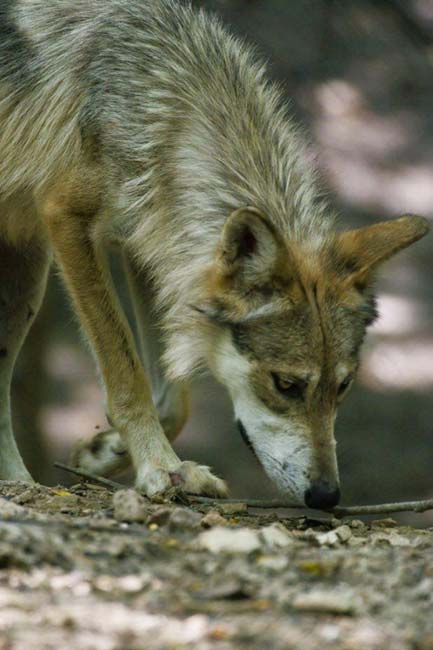Mexican Wolf Biography #8
 Laredo, Bluestem AM806, as a yearling at the Wild Canid Survival and Research Center – Photo courtesy of WCSRC
Laredo, Bluestem AM806, as a yearling at the Wild Canid Survival and Research Center – Photo courtesy of WCSRC
Anyone who grew up in a big family can identify with Laredo. The nearly seven-year-old alpha male of the Bluestem pack, also known as AM806, was one of eight squirming lobo puppies born at the Wild Canid Survival and Research Center, Eureka, Missouri, on April 25, 2003. His genetically priceless mother, Anna, despite being bottle raised herself, managed to raise all eight pups to maturity. No doubt Laredo learned to jostle his littermates for a chance to suckle and developed quick reflexes to grab his share of the carnivore diet fed to the growing pups. The skills he developed as a youngster have stood him well during the three-and-a-half years he has spent in the wild.
In October 2005, Laredo was sent to the Mexican wolf pre-release facility at Sevilleta National Wildlife Refuge, where he was paired with another genetically valuable wolf. Alita (F838), like Laredo, was descended from all three lineages of Mexican wolves in captivity. The two formed a pair bond, producing three pups in the spring of 2006. On July 6, 2006, Mexican wolf project personnel placed Laredo, Alita, and two surviving pups into a temporary mesh pen on the flank of Middle Mountain, in the Apache National Forest, Arizona. Later that day the animals chewed their way to freedom. By July 14, the male pup was dead by “unknown means,” according to the Mexican Wolf International Studbook update for 2006.
Laredo, Alita, and their sole remaining pup, a female, explored the territory around Middle Mountain. Unfortunately, in late September a poacher killed Alita, leaving Laredo and young female F1028 to fend for themselves. For a few weeks the two remained together. Eventually, they separated. Laredo wandered on both sides of the state line until mid December, when he appeared near the large and aggressive Bluestem pack in Arizona.
The Bluestem pack had lost its long time alpha male, AM507, in June 2006, also to unknown causes, but not before he had sired a litter of pups. The pack, which consisted not only of the alpha female and young pups, but also several yearlings, occupied a large territory in Arizona. Occasionally they moved outside their normal home range. On October 31, they were found far outside their usual haunts, across the New Mexico state line in the territory of the San Mateo pack. In early November project personnel found San Mateo M927 dead in far eastern Arizona, a victim of injury by other wolves, most likely members of the Bluestem pack.
Laredo must have learned well the assertiveness lessons that came from growing up with seven siblings. He moved into the heart of Bluestem territory only weeks after the pack apparently caused the death of San Mateo M927. Not only did he survive, but the project monthly update for December 2006 notes that by “December 16, the IFT (interagency field team) located Meridian pack AM806 with (Bluestem) AF521. The two remained together for the remainder of the month.”
Laredo remained with the Bluestem pack as its alpha male, siring at least three pups in 2007 that survived until the end of the year, according to the project annual report. The aging AF521 produced no pups in 2008, and eventually left the pack in April 2009. Laredo remained as alpha male, mating with F1042, an offspring of AF521 and original Bluestem alpha male AM507. Although the pair had a litter of four pups, the first for AF1042, only one was found on the end-of-year survey in mid-January 2010. Reintroduction supporters hope that with experience and a little luck, Laredo and his mate will den again in 2010 and raise more of their pups to maturity.



